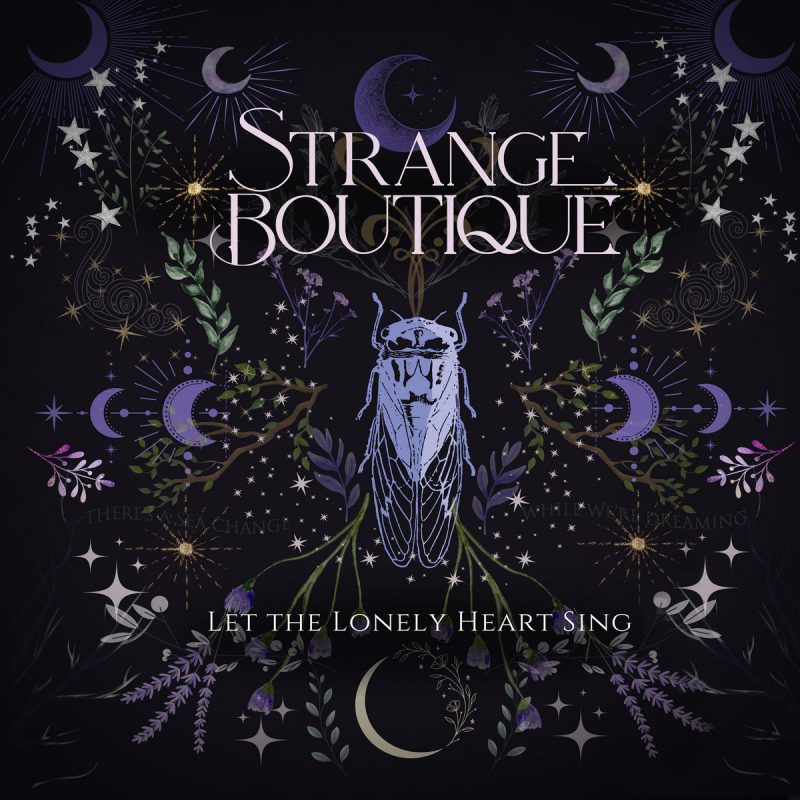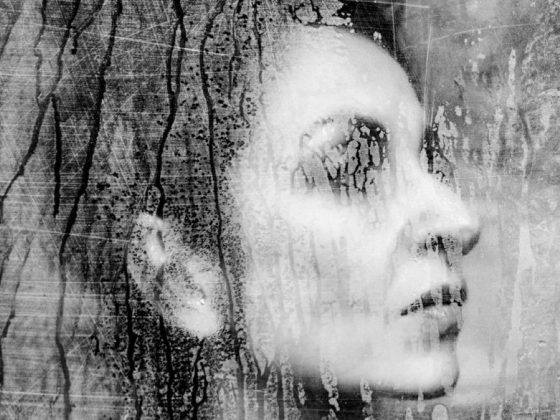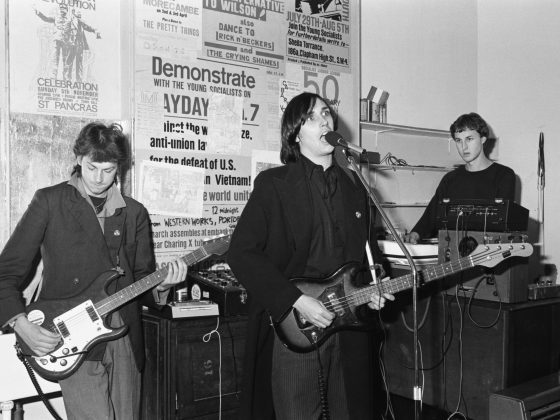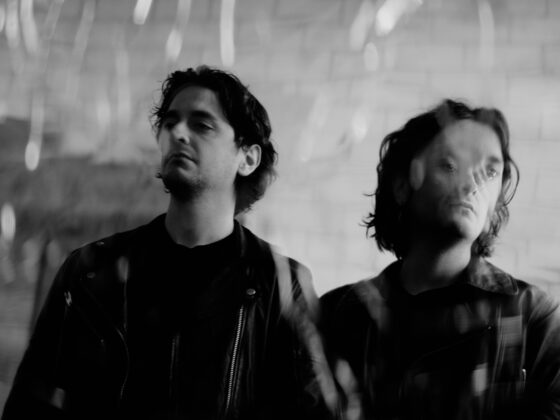Emerging from the twilight heart of Washington D.C.’s musical underground in 1987, Strange Boutique carved out a niche where gothic elegance danced feverishly with angular post-punk vigor. Rising from the raw energy of Madhouse, Monica Richards and Fred “Freak” Smith guided the ensemble through haunting terrains teeming with lush textures, mythical resonance, and romantic turmoil. After years of silence, a renewed resolve sparked by Smith’s passing has brought their return, standing defiant and resolute, reigniting the flame of their peculiar alchemy —an enduring voice in America’s Gothic realm. Now, the core trio of Richards, bassist Steve Willett, and guitarist Dennis Kane announce the release of a splendid new album, Let The Lonely Heart Sing.
Starting strong with the spectral grandeur of The Night Birds, the band plunges into the depths of internal disquiet, conjuring visions of nocturnal tension where hidden fears roost among the branches. Monica’s voice arcs and swoops, painting darkness with delicate beauty, as the track confronts emotional barricades erected by solitude, signaling a raw invitation to shatter those silent walls.
Radium Kiss echoes with perilous glamour, like a nighttime folk reverie dotted with fireflies, accompanied by the soft orchestra of cicadas and the sweet sound of violins. Here, Strange Boutique merges dangerous allure with the ticking inevitability of decay. The luminous veil conceals toxic truths beneath, evoking the chilling seduction of relationships mired in unseen poisons. Richards channels her dramatic vocals, harmonizing with the unsettling beauty of harm lurking just beneath the surface.
Twelve Chimes tolls gracefully with folky dreampop acoustic guitars reminiscent of Cocteau Twins circa 1993. Lyrically, it negotiates life’s brief dance with death, its melody imbued with gratitude amid ephemeral shadows. Romantic whispers weave through existential contemplation, defying dread with intimate gestures that transform mortality into a transcendent hymn, celebrating connection in the shadow of inevitability.
A tide of transformative optimism courses through Undersurface, where oceanic imagery signals profound rebirth. The track urges listeners to abandon distractions, embrace introspective renewal, and seize the power of imagination to reshape reality; a siren call to reinvention, surging toward brighter shores. It’s a blend of folk strings with soft vocals and graceful dancing melody evoking a tenderness that feels as if David Lynch were to direct a dance scene on a frontier fairground, lit by the glowing light of strung lanterns.
With a deep, resonant bassline and cascading guitar melodies, Jet Stream ascends on currents of spiritual yearning. Monica’s vocals weave together the sorrow of familial loss and ethereal visitations, crafting a poignant prayer for liberation. An enigmatic figure, the ‘Alter Hero,’ materializes—a ghostly guardian extending comfort that transcends mortal understanding. In this transcendent tapestry, memory and ethereal symbolism entwine, illuminating humanity’s timeless pursuit of solace beyond the limitations of the earthly realm.”
Zoid in Dreamland drifts into a late 80s-style alt-rock melody, driven by a soft bass saunter and Cure-like guitars. It is a portrait of deep yearning veiled in silence, with its poignant imagery of hidden hearts and mute birds underscoring emotional solitude. Yet beneath this separation, hope softly persists, promising enduring bonds resilient enough to weather distance and unspoken truths.
In Calliope, the muse serves as both tormentor and tormented. The song opens with soft vocals and a pulsating post-punk bass, gradually unfolding into a slow narrative enriched by emotive yet subdued melodic guitar strums and sighs. Here, the muse’s inspirational charm is shattered by manipulation and obsession. Chains are broken, innocence is lost, and genius intertwines with tragedy. The haunting mention of Orson casts a stark light on the perilous relationship between creativity and devastation.
“Whistle and I Will Come to You” enchants with its whimsical folk charm, driven by a lively string ensemble melody. Monica’s dynamic vocals flutter and soar, summoning emotional echoes from forgotten landscapes. In this haunting realm, ancient stones and shadowy silhouettes tell stories of unresolved loss. A brewing storm symbolizes imminent release, footprints marking the path toward acceptance. It is here, in the catharsis of shared sorrow transformed into song, that Strange Boutique finds healing, their melodies echoing softly through darkness into dawn.
Listen to Let The Lonely Heart Sing below and order the album, out now via Circle Music, here.
Post-Punk.com caught up with Strange Boutique about the songwriting process, influences for the new album, themes in the songs and their next plans as a band.
Jet Stream was the band’s first new music in 30 years. Was it difficult to adjust to creating new music as Strange Boutique again? Or was it easier, given the band had reunited previously in 2004 and in 2019?
Monica: After our reunion show in 2019, Dennis Kane knocked it out of the park when it came to helping us bring our older songs to life. Not only was it so comfortable to play with him, he had many aspects to his style and personality that just seemed to fit. We had such a great response that night, it seemed natural to write some new songs with him. We started writing not long after that show.
Steve: Once we decided to do it, … It was pretty easy to slip into that mindset. Dennis and I had been playing and writing together off and on for years so that came really easy. For me the big change was focusing on writing on the bass instead of guitar. There were also logistical challenges while we got used to writing separately but we found a rhythm and process that worked.
Dennis: I think after the rehearsals for the 2019 show, it was actually pretty easy to keep the momentum going. Steve and I have been writing together for about 25 years, so it wasn’t a challenge at all to come up with ideas. We worked remotely with Monica, sending her songs as we worked on them and she wove her words into them as if she were in the room with us!
What was the process for this new music evolving into a new full-length album?
Steve: After Jet Stream, we took a break without really having an agenda or timeline on what to do next. There were vague talks about doing something but we didn’t really have a plan. We were just working on songs in a very casual way, getting them close enough so we could bring in live drummers whenever the time felt right. After The Circle Music re-issued The Loved One on vinyl, we asked if they would be interested in a new album. They listened to the demos we had and said yes, … then the pressure was on to finish it!
Dennis: It all kinda came together haphazardly, at first. Steve and Monica and I would pass songs/ideas around and suddenly, we had an album!
Did the loss of guitarist Fred Smith affect the creation of this album, and are there parts of the album where his presence is felt?
Monica: The song Jet Stream was the first song we wrote, and it’s partly about him. The album itself seems to naturally revolve around loss, grief, ghosts, resurrection, and hope. So he’s swirling around in there, to be sure.
The guitars and bass lines on songs like “Night Birds” and “Twelve Chimes,” as well as throughout the entire album, are beautiful. The album feels like a lovely fusion of folk, dream pop, and post-punk, evoking a timeless quality that feels like they were written in the 1980s. Was the process of writing the guitar parts for the new album difficult for Steve, or did it come organically?
Steve: Other than Twelve Chimes, I intentionally wrote the songs for this album on the bass. After such a long break in writing for Strange Boutique, that seemed the surest way of making sure it felt like Strange Boutique. Once the proverbial flood gate opened, the initial bass lines came pretty easily. The main bass lines for Zoid, Radium Kiss and The Night Birds were all written in one night!! Then they were set aside as we worked our way through them and built each one into full-on songs. Calliope was one that came out fully formed. So, I think there’s an organic element to the initial seed that becomes the song. The challenge is expanding those ideas and finding the arrangements that fit best. For better or worse, I think my playing is reflective of the bass players I listened to in the 80’s, … Peter Hook, Simon Gallup, Derek Forbes, Steve Severin, Tim Butler. Apart from the acoustic on Twelve Chimes and a few random incidental parts, Dennis played (and wrote) all the guitars for this album. He also brought in Whistle, And I Will Come To You almost fully formed.
Dennis: I’m afraid the folk influence comes from me! I’m a folky at heart. Steve and I wrote our parts separately but then we blended/modified them during the recording process. Some songs were written together, like Nightbirds and Jet Stream, but many were parts I fit to bass parts Steve would send to me. It was kind of like virtual band practice!
Mythology and symbolic imagery play a significant role in your work. Could you explain how the band’s interest in these narratives began? Are there any favorite stories, collections of folklore, or books that inspired you? Additionally, how have these themes influenced the lyrics of specific songs, such as “Calliope” from your new album?
Monica: Mythology is what people would say lives right inside my wheelhouse. While I was in Strange Boutique, I was in college at AU, and Literature was my major. I was always reading amazing books, screenplays, poetry, world-wide and cultural mythologies. This is why my lyrics have often been based around literary themes of love, nature, identity… I was very influenced by the likes of Gabriel Garcia Marquez, he could write someone’s lifetime in a few sentences and you could hear, taste, and touch every little thing. Calliope is different. It’s about using the Goddess badly for one’s own power…
“Radium Kiss” features a shaking, maracas sound that evokes the feeling of insects bringing the night to life. I notice there is a cicada on the album cover. Could you elaborate on the imagery of the cicada and others throughout the album’s songs? Is the sound of night a theme in this album?
Monica: I chose the cicada after a great chat with Steve about its symbology, with the band itself resurrected after so many years, but with a new energy. Living in DC through the punk scene, the cicadas were all around us every Summer. But the 17-year cicada, the sounds were different. I called the sound “The song of future ghosts” because the cicadas had this spectral hum that filled every tree in the city. This summer when we return to the stage, DC will have another Cicada event! So it all fits perfectly.
The strings lend a lush, folk-driven quality to the three songs that feature them (Radium Kiss, Under Surface and Whistle, And I Will Come To You). Though I feel like there is something ’50s pop via David Lynch that permeates “Under Surface.” Can you tell us about the string musicians on this album and why you decided to include them?
Dennis: I would be super happy to give props to the amazing string players! Erin Snedecor – Cello, Zoe Kushubar – Violin, Rachel Riese – Viola and Gracie Carney – Violin. Steve wanted to do some strings on Under Surface, so I scored it but then I got carried away and we ended up with strings on three songs! We had talked about a more natural, open sound for the record so adding a quartet seemed to fit perfectly.
Steve: “50’s pop via David Lynch” … I love that!!! Under Surface was initially just a really minimal synth melody and a hypnotic drum loop. I knew it would be different than the rest of the material, but wasn’t sure what it should be, I just liked the simplistic melody and the idea of not using the traditional “bass-drums-guitars” approach. I handed that simple part to Dennis and asked him to score some strings around that melody. And, then boom, … the strings and Monica’s vocals gave the whole thing an identity.
Tracks such as “The Night Birds” and “Zoid in Dreamland” vividly portray themes of emotional isolation and unspoken truths. How personal are the narratives in the album’s songs, and were they challenging to express musically?
Monica: I love that you noticed the connection! The Night Birds was written after the death of my father, and my stepmother’s endless grieving. I felt/feel deeply for what she was going through, she thought she saw him in the shadows. Zoid in Dreamland is the other side of The Night Birds, where the loved one is on the outside looking in.
Dennis: I think we were all experiencing heavy life stuff at the time and it all just came out in the music/lyrics – I think it’s a very cathartic album, especially, Whistle, And I will Come To You. Monica has a gift in turning emotions into words and into emotions again and there’s no better example to me than that track!
Could you share some stories or memorable moments from the recording process of this album? Was there a particular song that underwent significant transformation or presented unique challenges?
Dennis: Lots of good memories! Recording in Baltimore with J Robbins (Magpie Cage Studios) was so fun and easy… working with David Christian and Gregg Hudson on drums was a real highlight as they’re both just super pros. The string recording session was amazing! As far as challenges go, Under Surface was a tough one to get right! It really only came together during the mix. There’s a lot going on under the surface (sorry for the pun) of that song and the mix was the place it just started to gel. It was pretty late in the game but all songs have their own timeline and this one wanted to wait until the last minute to be done!
Steve: Right after the Twelve Chimes guitar chords came out of nowhere, I recorded a quick verse/chorus demo and sent it to Monica. A few hours later, (a few hours!!!) she sent it back with vocals. I remember being devastated by the melody and amazed at how spontaneous the whole thing was. I’m going to agree with Dennis and say Under Surface was the most difficult. Probably because it’s outside our “bass-drums-guitars” comfort zone, … we were sort of winging it! Hearing the Boutique Strings play it for the first time blew me away. If there’s a song on the album that lines up with the theme of transformation, it’s Under Surface.
Fans would certainly be eager to experience Strange Boutique live again. Do you have plans to tour or perform special shows to introduce these new songs to audiences?
Monica: Right now, we’re concentrating on our show in Washington, DC, on July 12th!
Dennis: I’ll echo Monica here – we’re focusing on getting the Black Cat show just right for the fans!
Steve: I’m eager to experience Strange Boutique live again, too! We tend to work in a very linear manner, so, we completed the record, and now we’re focused on playing DC on July 12th. We’ll see what happens after that.
Follow Strange Boutique:
















 Or via:
Or via: